Highlights of the 5th International Congress on “China and the Islamic World: Cultural Encounters and Mutual Learning (2)
The 5th International Congress on “China and the Islamic World: Cultural Encounters and Mutual Learning” was held from June 26 to June 27, 2024 in Beijing. The congress comprises four sessions: Session 1 "Historical Contacts between China and the Muslim World”, Session 2 “Encounters and Mutual Learning in Arts and Sciences”, Session 3 “Encounters in Literature, Traditions and Philosophy”, and Session 4 “China and the Muslim World in the Contemporary Global System”.

Participants at the congress
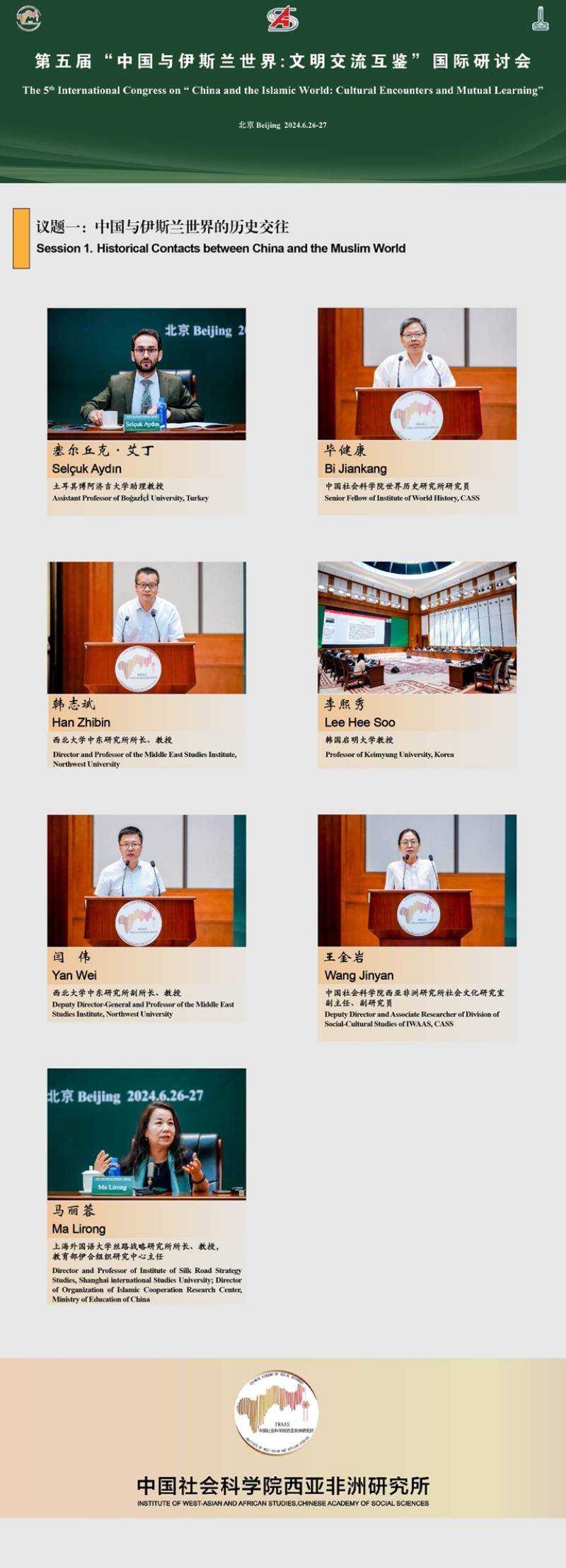
Session 1 speakers
Session One “Historical Contacts between China and the Muslim World” was moderated by Selçuk Aydın, Assistant Professor of Boğazİçİ University, Turkey. Bi Jiankang, Senior Fellow of Institute of World History, CASS, made a keynote speech titled “Du Huan's Journey to the West and the Mutual Understanding of Chinese and Arab Civilizations”. He traced the history of China-Arab trade with emphasis on Du Huan’s journey to the Arab world in Tang Dynasty, and elaborated on mutual learning between Chinese and Arab Civilizations in terms of people-to-people exchanges, trade-route and exchanges of merchandise and agricultural products.
Professor Han Zhibin, Director of the Middle East Studies Institute, Northwest University, made a speech titled “The Triple Logic of Global Civilization Initiative and Human Civilization Exchange and Mutual Learning”. He suggested that the logic of Global Civilization Initiative (GCI) and human civilization exchange and mutual learning lie in three factors: the practical needs, historical interactions and theoretical consciousness. Professor Lee Hee Soo from Keimyung University, Korea, delivered a video speech on "Pan-Islamic Activity of the Ottoman Empire in East Asia and Chinese Muslim Community in the Early 20th century". He explained, Pan-Islamism is a movement of the Ottoman Empire in the late 19th and early 20th centuries which attempted to revive the unifying strength of Islam. As part of the Pan-Islamic activities, Chinese Imam (Ahong) Wang Kuan was invited to Istanbul in 1906 by Abdul Hamid II. His invitation to Istanbul probably came out of the contacts and encouragement of Muhammad Ali who has previously visited Beijing in 1902 as the Sultan's private mission and stayed in Wang Kuan's residence. Professor Lee Hee Soo said that these archive materials reflected the important role of Pan-Islamism in fostering friendly exchanges between Chinese Muslims and the Islamic world .
Professor Yan Wei, Deputy Director-General of the Middle East Studies Institute, Northwest University, made a speech titled “Civilization Exchange between Ancient China and Iran”. He stated that China’s historical interactions with Islamic countries dated from as early as Han Dynasty, and developed through Tang Dynasty and Yuan Dynasty. He said, over time China and the Arab world witnessed increasing exchanges in technology, culture, politics and other areas. Wang Jinyan, Deputy Director and Associate Researcher of Division of Social-Cultural Studies of IWAAS made a speech titled “The contemporary significance of mutual learning between Chinese and Arab civilizations”. She made an overview of exchanges between China and the Islamic world, pointing out that the two sides have upheld political mutual respect and trust, pushed forward win-win cooperation and promoted mutual learning in cultural exchanges.
Professor Ma Lirong, Director of Institute of Silk Road Strategy Studies, Shanghai International Studies University, also Director of Organization of Islamic Cooperation Research Center, Ministry of Education of China, made comments on Session One. She said that the speakers covered different topics from both micro and macro perspectives to reflect the peaceful, diverse and open interactions between Chinese and Islamic civilizations, which will provide guidance for building of a sound international system.
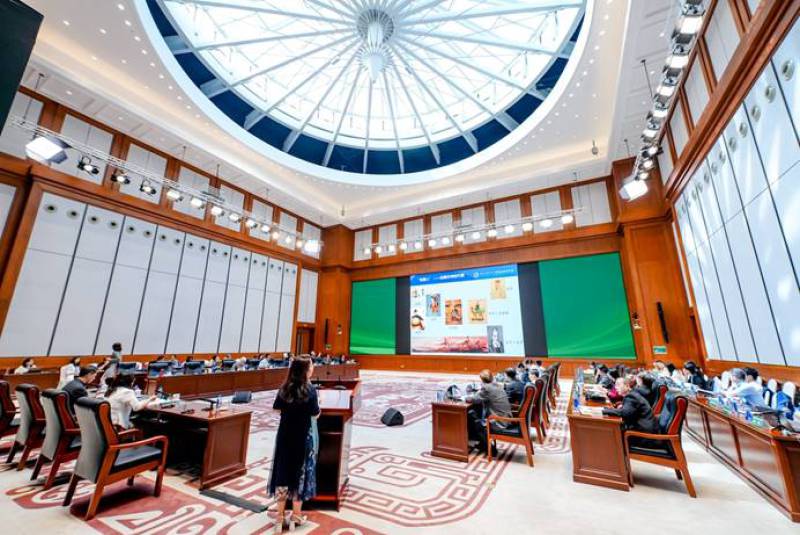
Participants at the congress
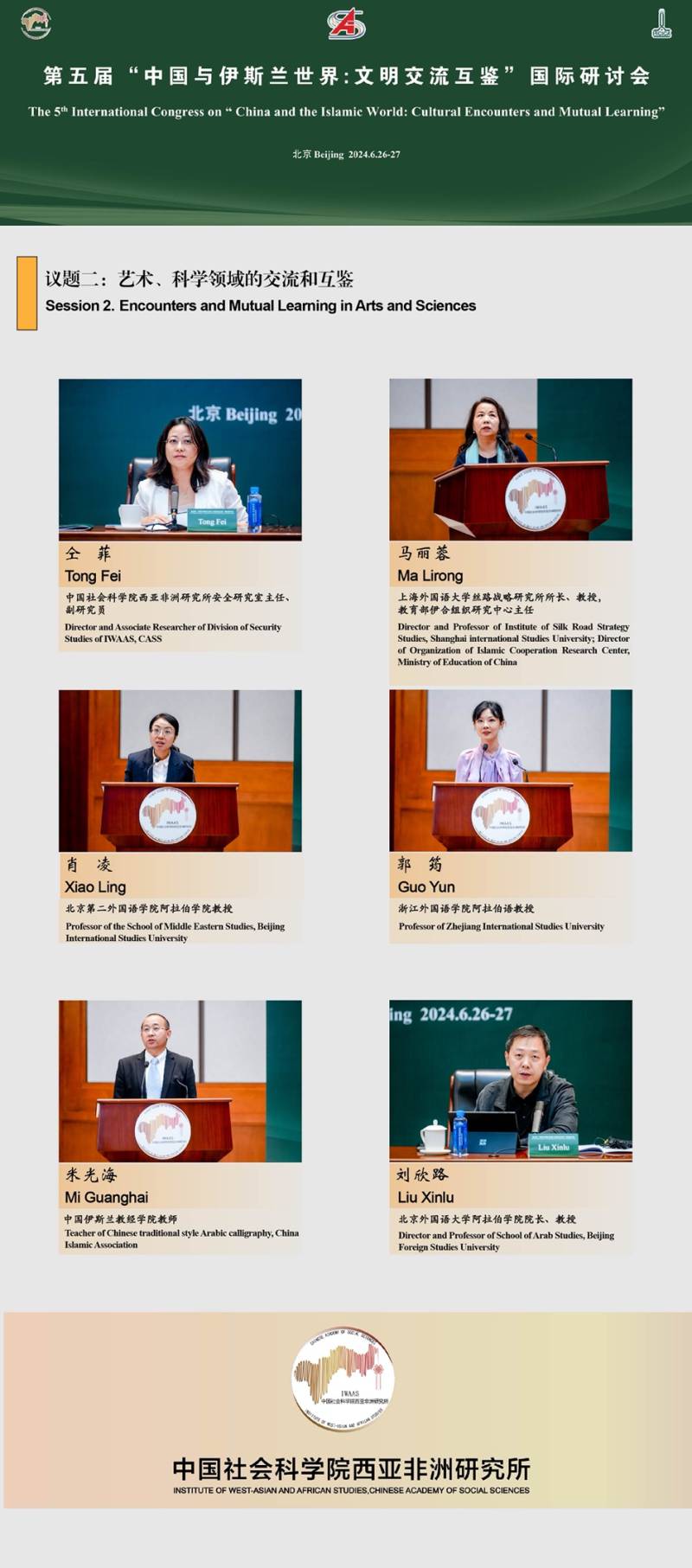
Session 2 speakers
Session Two “Encounters and Mutual Learning in Arts and Sciences” was moderated by Tong Fei, Director and Associate Researcher of Division of Security Studies of IWAAS. The first speaker of the session is Professor Ma Lirong. In her speech “The Belt and Road Initiative and Building of a Community with a Shared Future for China and Islamic World Silk Road”, Professor Ma Lirong talked about the basis, logic and significance of building a community with a shared future for China and Islamic World Silk Road. Professor Xiao Ling from the School of Middle Eastern Studies, Beijing International Studies University, made a speech titled “The Similarities Between The Traditional Values Of China And Arab-Islamic Civilization: A Perspective Of Cultural Linguistics”. She explained the similarities between Chinese and Islamic traditional values such as personal conduct from a perspective of cultural linguistics.
Professor Wang Guangda from Shanghai International Studies University, also Secretary-General of the China-Arab Research Center on Reform and Development delivered a speech focusing on“Biography of the Islamic Prophet in Chinese Writing”. He believes that Chinese culture holds a positive view towards Islam and its prophet Muhammad, considering Muhammad as one of the symbols of virtue and morality. His cultural image in China is one of purity, and Islamism and the related figures in Chinese writing are portrayed positively. This reflects that Chinese and Arabic cultures are in a relationship of equality, mutual respect and appreciation.
Guo Yun, Professor of Zhejiang International Studies University focused her speech on“The Development of Ancient Arab Maps and the Records of China in them from the 7th to 15th Century”. She said that the image of China depicted in ancient Arab maps are generally positive, which helped the Arabic world to learn about China through historical facts instead of mythical stories. Mi Guanghai, teacher of Chinese traditional style Arabic calligraphy of China Islamic Association, made a speech titled “Arabic Calligraphy in Chinese Tradition”. He talked about how Arabic calligraphy was introduced to China, and different types of Chinese traditional style Arabic calligraphy.
Professor Liu Xinlu, Director of School of Arab Studies, Beijing Foreign Studies University, made comments for Session Two. He said, cultural exchanges and mutual learning between civilizations are not simply the interactions of cultural symbols, but more about empathic resonance brought by in-depth communication in culture and values. Currently, country and areas studies are prevailing, therefore it is essential to leverage the irreplaceable value of language, literature, history, culture, geography and other fields of studies, in order to bring closer people-to-people ties.
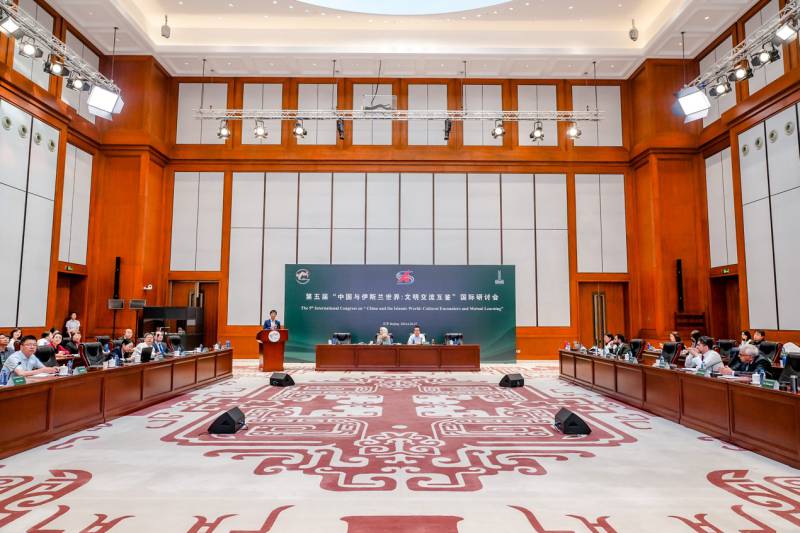
Participants at the congress
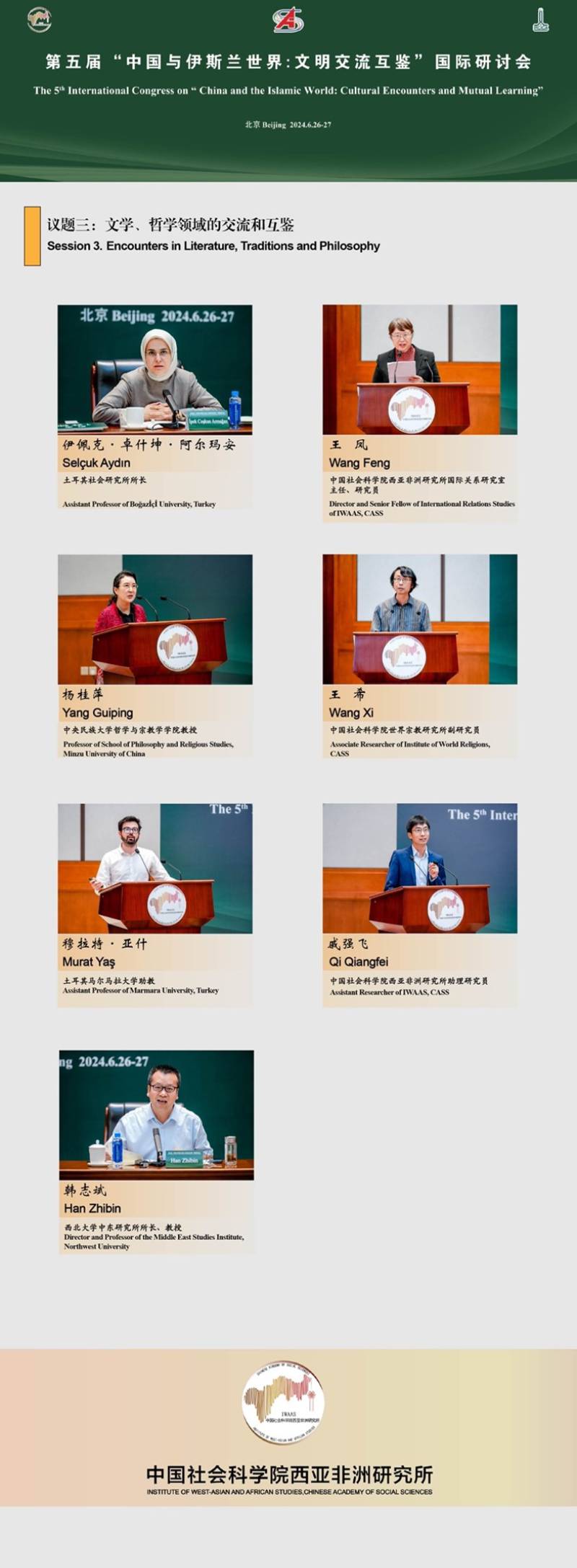
Session 3 speakers
Session Three “Encounters in Literature, Traditions and Philosophy” was moderated by İpek Coşkun Armağan, General Coordinator of Institute Social, Turkey. Wang Feng, Director and Senior Fellow of International Relations Studies of IWAAS, delivered a speech titled "The Traditional Political Thought of Twelver Shi’ism: its Connotation, Characteristics and Influence". She introduced the three stages in the evolution of Twelver Shi‘ism, and the sources for its traditional political thought that has an impact on the political theory in modern Iran. Professor Yang Guiping from the School of Philosophy and Religious Studies, Minzu University of China, made a speech titled “Historical Experience and Contemporary Practice Between Islamic Culture and Confucianism”. She pointed out that Chinese Islamic Philosophy is historical experience and rich resources of mutual learning among diverse civilizations. The integration of Islamic philosophy and Confucianism has contributed to the contemporary global dialogue among different civilizations and to resolving the conflicts among religions and nationalities.
In his speech “Historical Experience and Contemporary Reflection Between Islamic Culture and Confucianism”, Wang Xi,Associate Researcher of Institute of World Religions, CASS, underscored the achievements of Chinese Islamic Philosophy and its historical limitations, reflections and future development. Murat Yaş, Assistant Professor of Marmara University, Turkey, shared his research outcomes in his speech "Secularism, Law and Development of Islamic Finance: Lessons from Turkey”. He introduced the financial development in Turkey, and concluded that political parties’ interpretation of secularism can support and prevent development of Islamic finance industry.
Qi Qiangfei, Assistant Researcher of IWAAS, in his speech “Towards a Shared Metaphysics: Philosophy in China and Islamic World”, talked about the evolution of Philosophy in the Islamic World, starting from interpreting of scriptures to influences of ancient Greek Philosophy. He also explained how Muslim philosophers make distinction between “essence” and “existence”, and the development of Philosophical Sufism. He concluded that intellectual collaboration between the East and West is the means to address challenges in the new era.
Prof. Han Zhibin, Director of the Middle East Studies Institute, Northwest University, made comments on Session Two. He pointed out that the topics covered today are of quite academic nature, with speakers having insightful discussions on exchanges and mutual learning among civilizations. He stated that cultural encounters and mutual learning should not be based on skepticism and denial, but rather on harmony in diversity. Inter-civilization communication should shift from sensibility to rationality, from passive to active role, from necessity to freedom, and from opposition to dialogue. We should respect for diversity of civilizations, and philosophical thinking should be upheld to seek common ground while acknowledging differences.
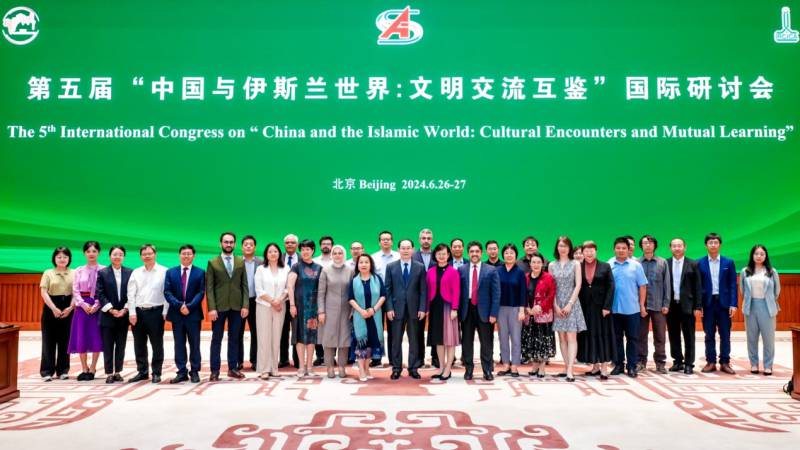
Group photo


